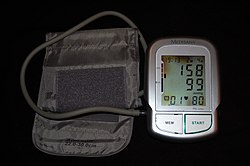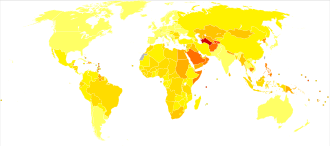Hypertensive heart disease

Editor-In-Chief: Prab R Tumpati, MD
Obesity, Sleep & Internal medicine
Founder, WikiMD Wellnesspedia &
W8MD's medical weight loss NYC, sleep center NYC
Philadelphia medical weight loss and Philadelphia sleep clinics
| Hypertensive heart disease | |
|---|---|

| |
| Synonyms | N/A |
| Pronounce | N/A |
| Specialty | N/A |
| Symptoms | Shortness of breath, chest pain, palpitations, fatigue |
| Complications | Heart failure, myocardial infarction, arrhythmias |
| Onset | Gradual |
| Duration | Long-term |
| Types | N/A |
| Causes | High blood pressure |
| Risks | Obesity, smoking, sedentary lifestyle, high salt diet |
| Diagnosis | Electrocardiogram, echocardiogram, chest X-ray |
| Differential diagnosis | Coronary artery disease, valvular heart disease |
| Prevention | Blood pressure control, lifestyle modification |
| Treatment | Antihypertensive drugs, lifestyle changes, surgery |
| Medication | ACE inhibitors, beta blockers, diuretics |
| Prognosis | Variable, depends on control of blood pressure |
| Frequency | Common in adults with hypertension |
| Deaths | N/A |

Hypertensive heart disease refers to a group of disorders that includes heart failure, ischemic heart disease, and left ventricular hypertrophy (excessive thickening of the heart muscle) resulting from high blood pressure. It is the leading cause of illness and death from high blood pressure and is one of the most common causes of heart failure.
Causes[edit]
Hypertensive heart disease is caused by the chronic elevation of blood pressure, also known as hypertension. Hypertension makes the heart work harder to pump blood, which causes the heart muscle to thicken (hypertrophy). Over time, this can lead to various forms of heart disease, including heart failure, ischemic heart disease, and arrhythmias.
Symptoms[edit]
The symptoms of hypertensive heart disease depend on the specific condition. For example, symptoms of heart failure can include shortness of breath, fatigue, and swelling in the legs. Symptoms of ischemic heart disease can include chest pain and shortness of breath. Symptoms of left ventricular hypertrophy can include chest pain, shortness of breath, and fatigue.
Diagnosis[edit]
The diagnosis of hypertensive heart disease involves a combination of medical history, physical examination, and diagnostic tests. These tests can include electrocardiogram (ECG), echocardiogram, and blood tests. The ECG and echocardiogram can show evidence of left ventricular hypertrophy and other changes associated with hypertensive heart disease.
Treatment[edit]
The treatment of hypertensive heart disease involves controlling the blood pressure and treating the specific heart conditions that result from the high blood pressure. This can involve a combination of lifestyle changes (such as diet and exercise), medications, and in some cases, surgery.
Prevention[edit]
Prevention of hypertensive heart disease involves controlling the blood pressure through lifestyle changes and medications. This can include a healthy diet, regular exercise, not smoking, and limiting alcohol intake.
See also[edit]
This cardiovascular disease related article is a stub.
Ad. Transform your life with W8MD's Budget GLP-1 injections from $49.99


W8MD offers a medical weight loss program to lose weight in Philadelphia. Our physician-supervised medical weight loss provides:
- Weight loss injections in NYC (generic and brand names):
- Zepbound / Mounjaro, Wegovy / Ozempic, Saxenda
- Most insurances accepted or discounted self-pay rates. We will obtain insurance prior authorizations if needed.
- Generic GLP1 weight loss injections from $49.99 for the starting dose of Semaglutide and $65.00 for Tirzepatide.
- Also offer prescription weight loss medications including Phentermine, Qsymia, Diethylpropion, Contrave etc.
NYC weight loss doctor appointmentsNYC weight loss doctor appointments
Start your NYC weight loss journey today at our NYC medical weight loss and Philadelphia medical weight loss clinics.
- Call 718-946-5500 to lose weight in NYC or for medical weight loss in Philadelphia 215-676-2334.
- Tags:NYC medical weight loss, Philadelphia lose weight Zepbound NYC, Budget GLP1 weight loss injections, Wegovy Philadelphia, Wegovy NYC, Philadelphia medical weight loss, Brookly weight loss and Wegovy NYC
|
WikiMD's Wellness Encyclopedia |
| Let Food Be Thy Medicine Medicine Thy Food - Hippocrates |
Medical Disclaimer: WikiMD is not a substitute for professional medical advice. The information on WikiMD is provided as an information resource only, may be incorrect, outdated or misleading, and is not to be used or relied on for any diagnostic or treatment purposes. Please consult your health care provider before making any healthcare decisions or for guidance about a specific medical condition. WikiMD expressly disclaims responsibility, and shall have no liability, for any damages, loss, injury, or liability whatsoever suffered as a result of your reliance on the information contained in this site. By visiting this site you agree to the foregoing terms and conditions, which may from time to time be changed or supplemented by WikiMD. If you do not agree to the foregoing terms and conditions, you should not enter or use this site. See full disclaimer.
Credits:Most images are courtesy of Wikimedia commons, and templates, categories Wikipedia, licensed under CC BY SA or similar.
Translate this page: - East Asian
中文,
日本,
한국어,
South Asian
हिन्दी,
தமிழ்,
తెలుగు,
Urdu,
ಕನ್ನಡ,
Southeast Asian
Indonesian,
Vietnamese,
Thai,
မြန်မာဘာသာ,
বাংলা
European
español,
Deutsch,
français,
Greek,
português do Brasil,
polski,
română,
русский,
Nederlands,
norsk,
svenska,
suomi,
Italian
Middle Eastern & African
عربى,
Turkish,
Persian,
Hebrew,
Afrikaans,
isiZulu,
Kiswahili,
Other
Bulgarian,
Hungarian,
Czech,
Swedish,
മലയാളം,
मराठी,
ਪੰਜਾਬੀ,
ગુજરાતી,
Portuguese,
Ukrainian
